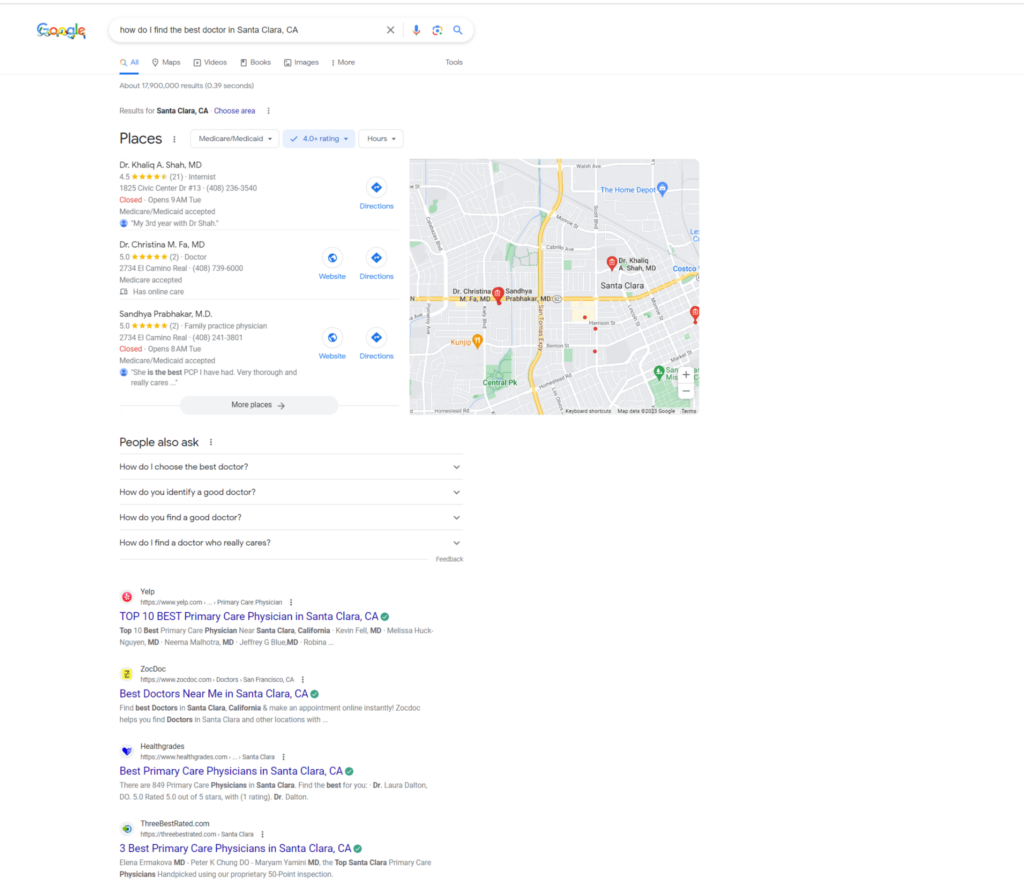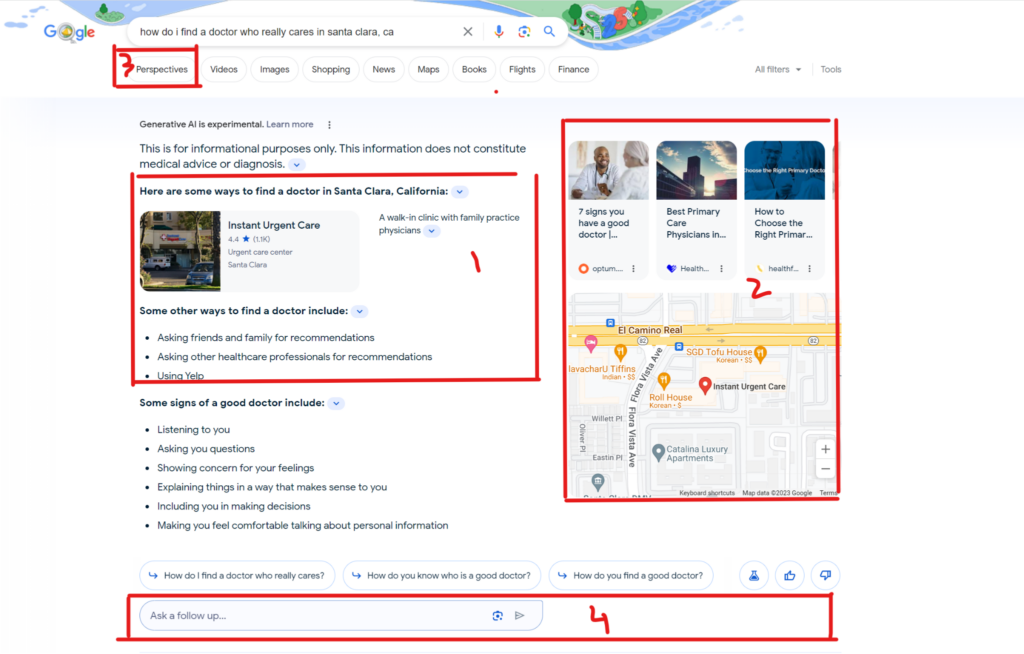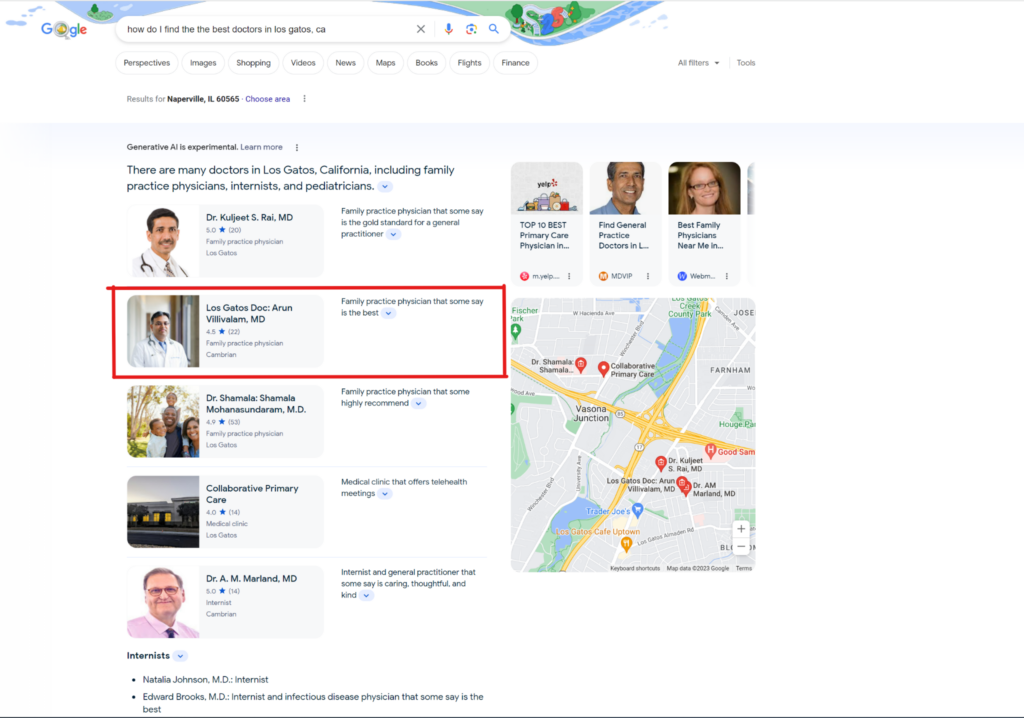BLOG
Generative AI-Led Search in 2024: How Healthcare Organizations Should Refine Their Strategies for Improved Search Visibility

We are a lead generation company with specialized expertise in organic search and paid search for healthcare and B2B verticals.
We are seeing some significant changes in search results, especially for healthcare, led by generative AI, propelling search engines, such as Google & Bing, to improve their search results in order to be more meaningful and personalized for their users.
In this article, we focus on competitive search strategies for healthcare organizations in the age of generative AI.
What are some of these search trends and how will they affect your ability to attract patients?
Google’s Search Generative Experience (SGE) – Google (and Bing) are working to bring generative AI capabilities into their search engines. Generative AI is poised to change the way search engines work and is the biggest search technology breakthrough in 25 years!
Google says: “With new breakthroughs in generative AI, we’re again reimagining what a search engine can do. With this powerful new technology, we can unlock entirely new types of questions you never thought Search could answer, and transform the way information is organized, to help you sort through and make sense of what’s out there.”
Google is not the only search engine experimenting with gen AI in search models. The new Bing, powered by ChatGPT, is already in business.
What does Gen AI-led Search mean for you as a healthcare business?
Earlier, if you typed in ‘how do I find a doctor who truly cares in Santa Clara, CA’ Google would provide you with the ten best sites and would expect you to sift through the websites to find the best doctor for you.
With SGE, Google will save you the trouble of sifting through results. Instead, it will rely on real-time information and Large Language Model-led AI analysis to provide search results so “you’ll be able to understand a topic faster, uncover new viewpoints and insights, and get things done more easily.”
Let’s see what an SGE will produce for the same search: ‘how do I find a doctor who truly cares in Santa Clara, CA.’
As you can see, Google’s SGE has done an analysis of content and produced a compilation of results to provide you with guidance on:
- Ways to find a doctor who truly cares in your location. There are websites that Google considers important and lists them. You want to appear here!
- A carousel of the top 3 websites that provide specific guidance on this topic, with the ability to click right on the carousel to see more websites. Another real estate on SGE that you would want to target.
- Google SGE also offers ‘Perspectives’ which allows user-generated content (UGC) from forums and discussions, including social media, to appear on SGE results. This, interestingly, is also a growing feature Google search currently. We expect perspectives to gain more importance in the coming months.
- Finally, with SGE, you can have a follow-up conversation with generative AI by typing in a follow-up question.
How do you go about appearing in Google’s SGE?
If you truly consider the impact of Google’s SGE, it is a paradigm shift in search. With generative AI capabilities, powered by Med-Palm 2, Google’s large language model trained to provide high-quality answers to medical questions, Google search for healthcare will be positioned to provide many healthcare-related informational questions on Google search itself, without the need to directly visit your website.
However, this does not mean that you cannot attract high-quality transactional search-led traffic to your website. Here are steps you can take to position your website high on generative AI-led search engines in the near future:
- A good foundational SEO strategy – First of all, you need to ensure that you appear high on organic search results currently. In that sense, a good current SEO base is your defensive strategy. This means authoritative content and the E.A.T. strategy should still be your foundational strategy!
Let’s talk about your offensive strategy next.
2. Clear content that is easy to read – SGE favors readability. Look at your readability score and summarize your page info into simple sentence structures followed by a clear call to action. This means presenting your information in a clear and easy-to-understand language.
3. Well-researched, current, and well-sourced content – Additionally, since healthcare websites fall in the ‘ Your Life, Your Money’ (YLYM) category, it becomes acutely important to put forward well-researched and well-sourced content on your website. This is because search engines are particularly demanding of the trustworthiness of your content if you provide advice regarding money or health. The more current, well-sourced, and trustworthy the content (as in quoted by a reliable healthcare site), the more likely it is to appear on SGE results.
4. Featured Snippets – A related offensive strategy, that is relevant not only for SGE but also current organic search results, is the creation of deep content and developing high authority backlinks to appear as a featured snippet on search.
This begs the question – What are featured snippets?
Featured snippets are valuable answers to search queries that are displayed at the top of search results. Featured snippets aim to provide quick and direct answers to questions being asked. SGE, in that sense, is an extended featured snippet with a summary of the most important information taken from a variety of sources, as opposed to a single source, as in the current featured snippet.
So, how do you go about being featured in the current Featured Snippet or the extended SGE of tomorrow?
- First of all, according to Google, it will source featured snippets only from authoritative sites, like government & healthcare sites. So that’s good news for healthcare businesses
Create deep content. What do I mean by deep content? In short, I mean content that meets professional compliance requirements and is medically vetted, so readers get valuable, up-to-date, and factually correct information. It also means creating dynamic and real-time content as far as possible. This is because Google favors “fresh and recent information sources.”
- Further steps include getting valuable links from reliable sources in the healthcare industry. To this end, a few things we do for our clients is to have a digital PR strategy for them by getting their content published in high authority industry sites, joining sites like HARO and Qwoted to get them published in reputed journalistic pieces, and building backlinks from local organizations, such as the Chambers of Commerce, professional associations, and local media.
- Focus on adding structured data that enables Google to easily parse markup data on your site & brand authority. For healthcare sites, make sure you include frequently asked questions (FAQs) related to healthcare services, article bylines & author schema markups.
5. Digital Reputation – As early versions of SGE become available for personal use, our experience shows that your digital reputation will be paramount in getting links within SGE.
While most healthcare practices think this means getting high ratings and laudatory reviews on Google Business Profile, Healthgrades, Yelp etc. digital reputation is a bigger goal than just getting good reviews.
Digital reputation can be built by combining good reviews with authorship. Ensure your practitioners are authoring articles, appearing on podcasts, and being quoted by reputable local and industry sites.
What Hasn’t Changed
As generative AI-led search becomes prevalent, foundational search strategies remain the same.
- E.A.T. Still reigns Supreme – Use content to build brand authority and authorship. Gen AI is even more likely to look at expertise, authority, and trustworthiness to decide which content links to include in its SGE search results.
- Local SEO Remains Important – Most healthcare organizations have a local focus. They tend to serve individuals in a certain locality. Building a strong local SEO strategy that includes building high authority local citations, will continue to be important for your business.
- Good technical SEO Still Matters – Using a crisp site structure that follows a clean and intuitive navigation structure. Use structured data to mark up the content of your website. For healthcare organizations, we strongly recommend healthcare service FAQs, medical organizations, and authorship markups. Maintain easy readability scores and summarize the information on your pages at the top in clear and concise language, followed by a call to action.
In conclusion, make sure you work with a forward-thinking marketing team that stays ahead of their domain curve, so you don’t have to.
Here are two examples of strong digital reputation management for our clients that have led them to appear prominently in Google’s SGE:
In that sense, some things never change. Search engine optimization (SEO) has never been about tricking Google through paid links or keeping up with algorithm changes. It is about improving user experience (UX) and providing value to your users – if users and influencers find your website relevant and useful they will keep coming back and Google will notice! And that’s the reason we don’t lose page rankings to algorithm changes.
Learn more about our healthcare patient generation services and our other digital solutions for healthcare organizations.

Contact us for FREE 1 Hour Web Consultation
Schedule your free consultation today to discuss how our website technlogies sercices can benefit your enterprise.
Get in Touch


 LINKEDIN
LINKEDIN FACEBOOK
FACEBOOK TWITTER
TWITTER INSTAGRAM
INSTAGRAM


